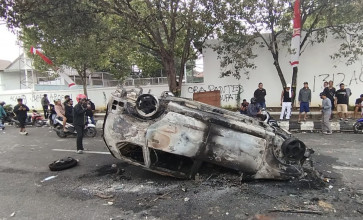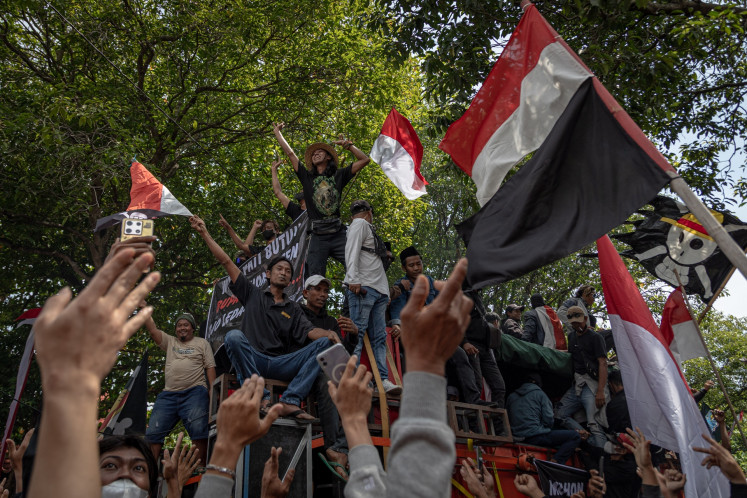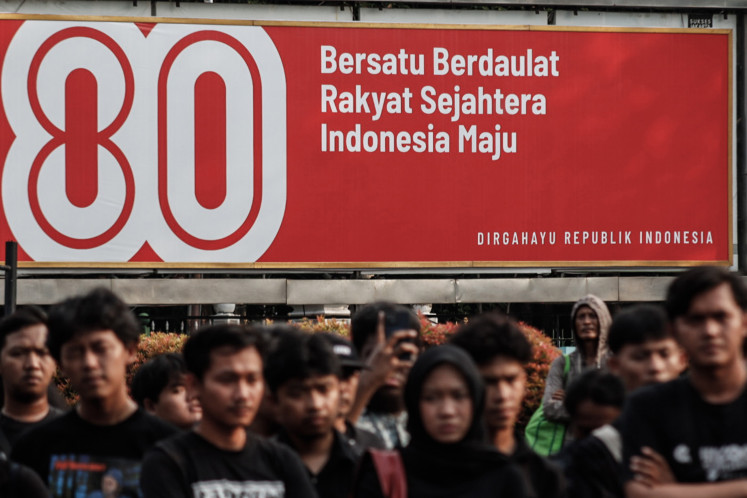Popular Reads
Top Results
Can't find what you're looking for?
View all search resultsPopular Reads
Top Results
Can't find what you're looking for?
View all search resultsIs a one-for-all national Islamic calendar possible?
Muslims in Indonesia have many different ways of interpreting the starting times for new months
Change text size
Gift Premium Articles
to Anyone
M
uslims in Indonesia have many different ways of interpreting the starting times for new months. The same date could fall on two different days, as happened at the beginning of the Ramadhan fasting month this year.
The Ministry of Religious Affairs has taken measures to face up to and solve this problem. It has done its best to reach a shared perception of the hilal (new moon) in order to avoid repeating unnecessary disputes among Muslims. The ministry has continuously held and facilitated dialogue among Muslim organizations to reach an agreement on criteria for the new moon that would settle the differences once and for all.
To participate in such an effort, Indonesian Muslims need to open their minds. They should wisely understand that something perceived to be 'exact' does not always mean to be exact.
It may be the subjective thought of ulema. If Muslims conduct studies or research of old and new books written by ulema about fiqh (Islamic Law), they will find that a variety of opinions on a subject, according to Usul al-Fiqh (Islamic jurisprudence), belong to ra'yu (subjective judgment, viewpoint or statement).
The second caliph, Ummar Ibn Khattab said there could be different thoughts in ra'yu. That is why ra'yu about the criteria of the new moon adopted by Indonesian Muslims cannot be considered final.
According to Abu al-'A`la al-Maududi, fiqh is only a discourse of law and not binding until after it is stipulated in a country. The discourse is only a matter of choice and the authority will pick the choice only after considering its benefits to the country.
In the light of this thought, when there is a possibility that the beginning of the new month will be interpreted to fall on a different day, a group of Muslims who do not perform rukyatul hilal (new moon sighting) with naked eyes are not supposed to label other groups who still hold a very conservative method and criteria as primitive.
Likewise, Muslims who believe in rukyatul hilal cannot label the other group as contravening Islamic law. What they call the truth is simply a claim, whilst their claim is only their perception of truth.
During last year's meetings of leaders of Muslim organizations at the Ministry of the Religious Affairs to determine the beginning of the new month of Ramadhan and Syawal, some of them quoted the hadith that says 'Fast if you see the new moon and break the fast [celebrate Idul Fitri] if you see the new moon.
If the new moon is obstructed by cloud and you cannot see it, just make the Sha'ban [the month before Ramadan] into 30 days [Narrated by Bukhari].' Others emphasized another hadith: 'A month has 29 days. Don't fast if you don't see the new moon and don't have Idul Fitri. If the new moon is covered by cloud and you cannot see it, just predict [Narrated by Muslim].'
The two hadith are relevant to the current phenomenon Muslims face today, but if Muslims adhere to only one of them, they merely justify that which they perceive. Ideally, the two hadith are combined, especially
because in many cases the new moon cannot be sighted although according to the hisab (calculation), the position of the new moon is high enough.
The two hadith are indeed relevant for Indonesian Muslims to conduct a thorough study to set up a one-for-all national Islamic calendar. Indonesia may learn from South Africa in this case.
According to South African experts, Ramadhan 29, 1432 (Aug. 29, 2011), the new moon was located at 6-7 degrees, the highest position for Africa and Asia at that time. However, the scholars, with support from sophisticated technology failed to sight the new moon.
On the contrary, lay people with naked eyes were reported to have sighted the crescent at the degree of 0.5. It required a thorough study to find out if the experts did not understand the crescent or the lay people did not know the characteristics of the new moon. What happened in South Africa also occurred in Oman, Morocco and Libya.
The South African case is a call for Indonesian Muslims to have a thorough comprehension about the two hadith contextually.
Sofjan Siregar, an Islamic law professor at the Islamic University of Rotterdam, has said that the hadith are not supposed to be understood the way primitive people did because scientifically the cycle of the moon is very dynamic.
The two hadith actually show that the Prophet knew the objects in the sky were dynamic. Therefore, Muslims need to verify. If the astronomical calculation indicates the position of a new moon remains low, the first hadith should be applied. The second hadith should be taken into account if the crescent is high enough.
Smarting from South Africa and having experienced different days for starting a new month, Indonesian Muslims need to build a consensus on national criteria for the new moon. To start with, they have to think of the national interest. Then, they need to explore, share and agree on mathla (sighting zone) through a thorough discussion.
Regarding the new moon sighting, they do not have to experience a physical sighting if the crescent reaches the criteria agreed upon by the MABIMS (the Association of the Ministries of the Religious Affairs from Brunei Darussalam, Indonesia, Malaysia and Singapore). The new moon needs to be sighted physically only if the crescent is located below the criteria.
It is not doctrinal Islamic law that hinders the possibility of having a one-for-all national Islamic calendar for Indonesia, but the absence of a willingness among Muslim groups to create it.
The writer obtained his doctoral degree from Jakarta State Islamic University and is a lecturer at the University of Indonesia.










